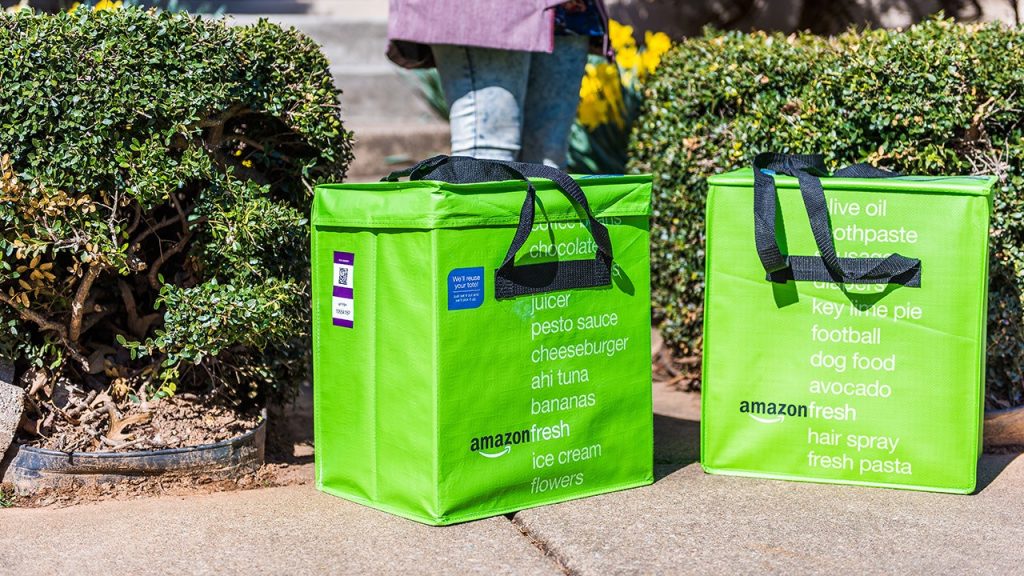Key takeaways
- With Amazon’s Prime Big Day Deals fast approaching (Oct. 10 and 11, 2023), now is a great time to sign up for an Amazon credit card.
- Among the options are cards that offer welcome bonuses upon approval and high ongoing rewards for everyday purchases.
- The right Amazon credit card for you depends on which perks you want, whether you’re a Prime member and whether you want a credit card you can use for all your regular spending or just one for Amazon-connected purchases.
The best credit cards for shopping on Amazon let users earn the top rewards rate on everything they buy from the online retailer and its associated brands, including Whole Foods. That said, there’s more than one Amazon credit card to consider, so you’ll need to do some research before you apply. And if you’re planning to take advantage of Amazon Prime Big Day Deals from Oct. 10-11, you’ll want to act fast.
When it comes to store cards, that is those for use within a limited Amazon universe, Synchrony Bank offers the Amazon Store Card* and its counterpart for Amazon Prime members, the Amazon Prime Store Card*. Synchrony also offers secured versions of these cards, the Amazon Secured Card and Amazon Secured Prime Card. Both secured cards required a minimum security deposit of $100 to establish your line of credit.
If you’re looking for a card to use for purchases with Amazon and beyond, Chase offers the Amazon Visa* (formerly known as the Amazon Rewards Visa Signature Card) and the Prime Visa (formerly known as the Amazon Prime Rewards Visa Signature Card).
Although any of these cards can enhance your shopping experience, it’s good to know which Amazon card is best for your financial situation and Amazon shopping habits. Essentially, your card of choice will boil down to your credit score and whether you’re an Amazon Prime member.
Here’s a quick guide to the various Amazon credit card options to help you choose the best one for your lifestyle.
Amazon Prime Store Card vs. Prime Visa: At a glance
As mentioned, Synchrony and Chase offer different versions of their credit cards based on your Prime membership status. The card application process will direct you to the card that matches your Prime status. In either case, being a Prime member is the best way to maximize your credit card rewards on Amazon purchases.
Even though you’ll earn 5 percent back on Amazon.com purchases with both the Prime Store Card and Prime Visa, the two cards still have significant differences — including their welcome bonuses, approval odds and cardholder benefits.
| Rewards rate |
|
|
| Sign-up bonus | An $80 Amazon gift card upon approval | $100 Amazon gift card upon approval |
| Annual fee | $0 (but requires $139 Amazon Prime membership) | $0 (but requires $139 Amazon Prime membership) |
| Card perks |
|
|
Amazon credit cards: Key differences
Open vs. closed loop
A big difference between the Synchrony Amazon cards and Chase Amazon cards is where you can use them. Synchrony’s Amazon cards are closed-loop credit cards, meaning you can only use them at a specific store or family of brands. In this case, you can use Synchrony’s card only on Amazon.com and Audible.com purchases and with select Amazon Pay merchants.
Chase’s Amazon cards, however, are open-loop cards, meaning you can use them anywhere Visa cards are accepted. This means you can use the Prime Visa for dining out, groceries, regular bills, miscellaneous spending and more in order to increase your rewards haul over time.
Approval odds
Another major difference between Synchrony and Chase Amazon cards is the approval requirements. Typically, you can qualify for Synchrony’s Amazon store cards with a fair credit score (580 to 669). On the other hand, you’ll likely need at least a good credit score (670 to 739) to qualify for one of the Amazon Visa cards from Chase.
Rewards
Both the Amazon Prime Store Card from Synchrony and the Prime Visa from Chase offer 5 percent back on Amazon.com purchases. However, Chase’s Prime Visa also offers 5 percent back on Whole Foods purchases, Amazon Fresh purchases and Chase Travel purchases with an eligible Prime membership, as well as 2 percent back on restaurant, gas station and local transit and commuting purchases. All other spending earns 1 percent back.
The Amazon Visa, for non-Prime members, offers only 3 percent back on Amazon.com, Amazon Fresh, Whole Foods and Chase Travel purchases but earns the same rewards as the Prime Visa in other categories: 2 percent back on restaurant, gas station and local transit and commuting purchases and 1 percent back on everything else.
Without a Prime membership, you don’t earn any rewards with Synchrony’s Amazon Store Card. Also, your rewards with the Amazon Prime Store Card are not as flexible as the ones you earn with Chase Amazon cards. Amazon Prime Store Card rewards can only be used toward Amazon.com purchases. However, your Prime Visa and Amazon Visa rewards can be redeemed in many ways — cash back via bank deposit, statement credits for Amazon purchases or gift cards. You can also use rewards earned with the Prime Visa and Amazon Visa to book travel through Chase.com.
Financing options
While Amazon store credit cards from both Synchrony and Chase feature promotional financing offers for cardholders, namely Equal Monthly Payments financing, the terms are slightly different.
Synchrony’s Amazon store cards offer longer financing periods on Equal Monthly Payments purchases. With the store cards, you can get six, 12 or 24 months to pay off your purchase at a 0 percent APR:
- 6 equal monthly payments on purchases of $50 to $599.99
- 12 equal monthly payments on purchases of $600 or more
- 24 equal monthly payments on select purchases
Note that you do have to give up the rewards you could earn on eligible purchases in order to apply these special financing offers.
Conversely, the Chase Prime Visa and Amazon Visa cards offer six or 12 months to pay off your purchase with no interest, with the following requirements:
- 6 equal monthly payments on purchases of $50 or more
- 12 equal monthly payments on purchases of $250 or more
Once again, however, you have to forgo rewards on purchases when you apply these special financing offers.
There’s also Amazon’s Special Financing, which uses a deferred interest model and is typically available to Synchrony cardholders. Chase cardholders may also qualify.
Note that the 29.99 percent variable APR on Synchrony’s Amazon store cards is fairly high compared to the average credit card interest rate and could come back to haunt you if you use the Special Financing option.
For more information, consider reading through Bankrate’s complete guide to Amazon financing and payment plans.
Which Amazon credit card is best for you?
Whether you get a store credit card from Synchrony or a Chase credit card, we recommend you get the Prime version if it makes sense to do so.
If your credit isn’t good enough to get a Chase credit card, consider one of the Synchrony Amazon cards — preferably the Prime version so you can earn rewards. Of course, only apply for this card if you can justify the $139 annual cost of Prime membership (perhaps with enough spending that your rewards end up covering it or by fully utilizing the full slate of options that come with Prime membership including free shippng on qualifying purchases, all the Amazon Prime streaming options and more.
If your credit is good enough for a Chase card, the Prime Visa is certainly worth it. You can use the same spending strategy to cover your Prime membership cost with rewards, but in this case, you’ll have more spending options to earn rewards on.
Whichever card you choose, just make sure you use it wisely — and don’t use your Amazon credit card to enable overspending. Be sure to pay your balance in full each month to avoid interest charges and only purchase what you need.
The bottom line
Amazon Prime Big Day Deals will be here before you know it, and you need to make sure you’re paying with the right credit card. While you can always use a regular cash back credit card or a travel credit card for your online shopping bills, picking up one of the Amazon credit cards could help you earn a higher rewards rate on Amazon.com, Whole Foods purchases and more.
Whether you should get a store card or the Prime Visa depends on if you want to be able to use your card for other bills and spending, too. Other factors to keep in mind include the added perks you can get with the Prime Visa, as well as the credit score you’ll need to get approved.
*All information about the Amazon Store Card, Amazon Prime Store Card, Amazon Secured Store Card, Amazon Prime Secured Store Card and Amazon Visa has been collected independently by Bankrate.com and has not been reviewed or approved by the issuer.
Read the full article here
















